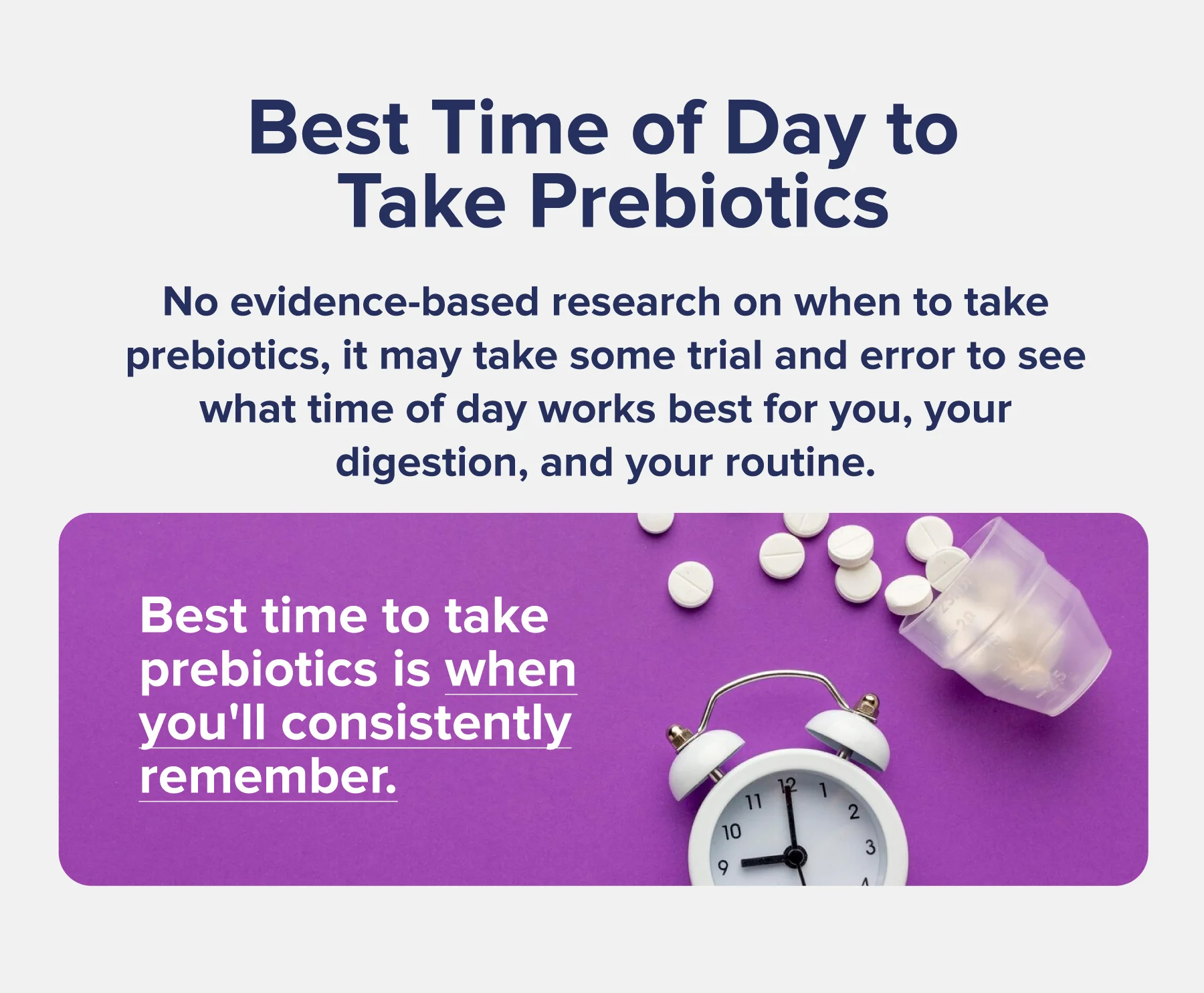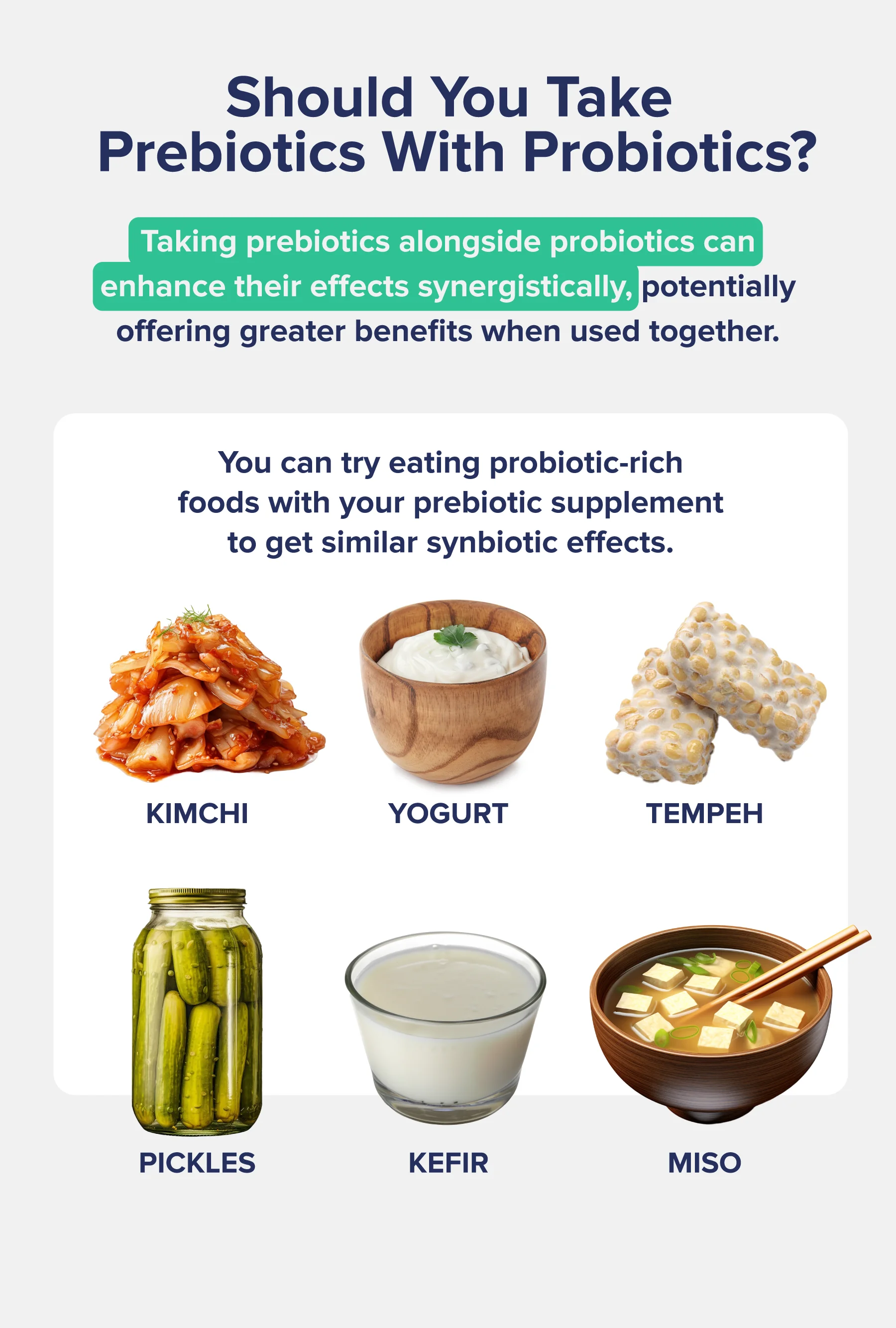Talk to a Registered Dietitian and use INSIDER20 for 20% off!
Talk to a real Dietitian for only $99: Schedule Now
This post contains links through which we may earn a small commission should you make a purchase from a brand. This in no way affects our ability to objectively critique the products and brands we review.
Evidence Based Research To fulfill our commitment to bringing our audience accurate and insightful content, our expert writers and medical reviewers rely on carefully curated research.
Read Our Editorial Policy
If you’re one of the two-thirds of Americans who deal with digestive problems, you may be on the hunt for ways to alleviate your symptoms.
As you probably have already added probiotics to your regimen, prebiotics are the next most likely supplement to add to your shelf, given their health benefits for digestion, immune function, mental health, and more.
Now, the question is: when is the best time to take prebiotics? In the morning or night? On an empty stomach, with food, or with your probiotic? For a TL;DR answer, the best time to take prebiotics is when you will consistently remember to take them. You don’t need to take prebiotic supplements with food, but if you also take probiotic supplements, taking them with your prebiotic can maximize their synergistic effects.
A quick browse around the Internet provides vastly different answers to the question of when to take your prebiotics.
Some sites claim that you must take prebiotics on an empty stomach in the morning, while others recommend taking them with a meal or right before bed.
So who’s right? Well, it’s not exactly black-and-white, but we’ll try to answer it for you as best we can.
Research on prebiotic supplements does not typically assess timing. Unlike probiotics, where there are more studies on the topic of supplement timing, we don’t yet have the same information on prebiotics.

Therefore, the “best time of day to take prebiotics” is based on anecdotal evidence and theories about digestive function.
If you are taking prebiotics to help with constipation, you may want to take them in the morning to “jumpstart” your digestion and hopefully help you get things moving along in your gut.
As there is no evidence-based research on when to take prebiotics, it may take some trial and error to see what time of day works best for you, your digestion, and your routine.
Overall, the best time of day to take prebiotics is when you will consistently remember to take them.
If you always take your vitamins and supplements in the morning, don’t try to add them to your evening routine—you’ll have a better chance of consistency if you incorporate them into your existing supplement regimen.
Again, there is no scientific evidence about whether or not to take prebiotics on an empty stomach or with food.
It’s possible that prebiotic supplements may work better when consumed with food, as that would mimic how we naturally consume prebiotic fiber (i.e., in combination with other foods).
If you are using prebiotics to manage your blood sugar levels, taking them with a meal—ideally, your highest-carbohydrate meal of the day—will be beneficial. The fiber found in prebiotics will slow down glucose absorption into your bloodstream, leading to smaller blood sugar spikes.
Some people wonder if consuming food and prebiotics together will reduce nutrient absorption or effectiveness. However, there is no need to be concerned because our digestive systems do not break down prebiotic fibers. Prebiotics benefit health because they are not able to be digested by us, so eating food with prebiotics will not affect how our bodies use them.
Overall, if you want to help manage blood sugar levels, consider taking prebiotic supplements with carbohydrate-containing meals.
Otherwise, feel free to experiment and see what works best for you. If you experience digestive side effects (like bloating, gas, or abdominal pain) from prebiotics, consider splitting the dose throughout the day and taking them with food.
While you don’t have to take prebiotics with probiotics, they work synergistically and may provide a greater benefit if taken together.

The supplemental combination of prebiotics and probiotics is called synbiotics, which we’ll discuss more in a later section.
If you don’t take probiotic supplements, you can try eating probiotic-rich foods with your prebiotic supplement to get similar synbiotic effects.
Probiotic foods are fermented foods, including yogurt, kefir, sauerkraut, kimchi, natto, fermented and pickled vegetables, miso, and tempeh.
Prebiotics are a type of fiber we eat that good bacteria in our digestive system consume for energy.
Put simply, prebiotics are fuel for probiotics to grow and thrive in the gut.
For a technical definition, prebiotics are described as “nondigestible food ingredients that beneficially affect the host by selectively stimulating the growth and activity of bacteria in the colon, thus improving host health.”
According to the International Scientific Association of Probiotics and Prebiotics (ISAPP), the following criteria are used to classify a compound as a prebiotic:
This means that prebiotics are types of dietary fiber that are not digested or absorbed by our digestive system and selectively stimulate the growth of beneficial gut bacteria.
Instead of being digested or broken down by our intestinal tract, prebiotics are consumed and fermented by various microbes in the colon (large intestine).
When our colonic bacteria consume prebiotic fiber, these healthy microbes can grow and thrive in the gut, which benefits the host (us!).
The breakdown of prebiotic fibers primarily stimulates the growth of Bifidobacterium and Lactobacillus, genera of beneficial bacteria known to improve gut health.
Different types of healthy bacteria use carbohydrate-hydrolyzing enzymes to break down and ferment prebiotic fibers, producing hydrogen, methane, carbon dioxide, lactate, and short-chain fatty acids.
In turn, these fermentation byproducts (also known as metabolites) provide energy for certain gut bacteria to use, allowing them to continue living and growing in the colon and improving our health in various ways.
Prebiotics are beneficial to the gut and many other areas of the body primarily because they lead to the production of short-chain fatty acids (SCFAs).
SCFAs are beneficial fermentation byproducts known as metabolites produced when our intestinal bacteria feed on prebiotic fibers.
The three primary SCFAs are acetate, propionate, and butyrate, which account for 90% of the SCFAs produced by probiotic bacteria.
Colon cells in the gut’s epithelium (the thin layer of epithelial cells making up our gut lining) prefer to use butyrate as a fuel source (even more than glucose).
Butyrate is an essential nutrient that helps colonocytes (colon cells) grow and thrive. It promotes normal colon cell growth, supports healthy mucus production, and strengthens the intestinal barrier.
Therefore, having enough available butyrate (from eating prebiotic fiber) may be critical in protecting against colonic disorders.
SCFAs also lower pH in the lower digestive system, thereby limiting the growth of bad bacteria that cannot survive in lower-pH environments, and enhance mineral absorption, including calcium.
In summary, there are two primary mechanisms by which prebiotics are thought to support gut health (and overall health):
Because of these reasons, prebiotics are beneficial for several aspects of human health, including:
For more detailed information about the benefits of prebiotics and the available research on these topics, head over to this article.
Prebiotic supplements can help to bridge the gap if you do not consume enough prebiotic foods.
A full list of our top-rated prebiotic supplements can be found in this article: Best Prebiotics for Gut Health.
A few of our favorite prebiotic supplements include:
Synbiotics are supplements that combine prebiotics and probiotics. They can be beneficial because prebiotics are an energy source for probiotics. Taking a synbiotic can maximize the synergistic effects of probiotics and prebiotics.
They can be particularly helpful if you don’t eat a high-fiber diet. In this case, choosing a synbiotic supplement instead of just a probiotic supplement can ensure that the beneficial microbes have enough fuel to consume and can survive and thrive in your gut.
Some of our favorite synbiotic supplements that combine probiotics and prebiotics include:
If you are not used to consuming much dietary fiber, you may experience some digestive discomfort the first few times you take prebiotics. If this happens, you can try splitting up dosages or taking the smallest dose for a few days. Over time, prebiotics should improve your digestive health, including reducing constipation, bloating, gas, and diarrhea, among other benefits to overall health.
It is beneficial to take prebiotics and probiotics together. This combination is called a “synbiotic,” as these two supplements work synergistically to benefit your gut microbiome. Probiotics are beneficial bacteria that populate the gut, while prebiotics are the fuel that probiotics consume to stay alive and thrive in the gut.
There is no scientific evidence looking at the timing of prebiotic supplements. You probably do not need to take your prebiotic separately from food. Taking prebiotics with food may even be beneficial because it mimics our natural state of eating multiple foods together and can blunt blood sugar spikes.
The best time to take prebiotics is when you will consistently remember to take them. If you are taking prebiotics for constipation, you could consider taking prebiotics in the morning to nudge your digestion along.
The top prebiotic-rich foods include:
• Leeks
• Asparagus
• Chicory root
• Green bananas (less ripe)
• Jerusalem artichokes (sunchokes)
• Garlic
• Onions
• Certain whole grains like wheat and barley
• Oats
• Beans
• Cooked-then-cooled potatoes
One of the main signs that you need prebiotics (either in your diet or from supplements) is if you have digestive disorders, digestive symptoms, or poor gut health, including gas, bloating, constipation, or diarrhea. Low to moderate doses of prebiotics may help these conditions and support a healthy gut microbiome, but remember that high doses (at least in the beginning) can worsen your symptoms.